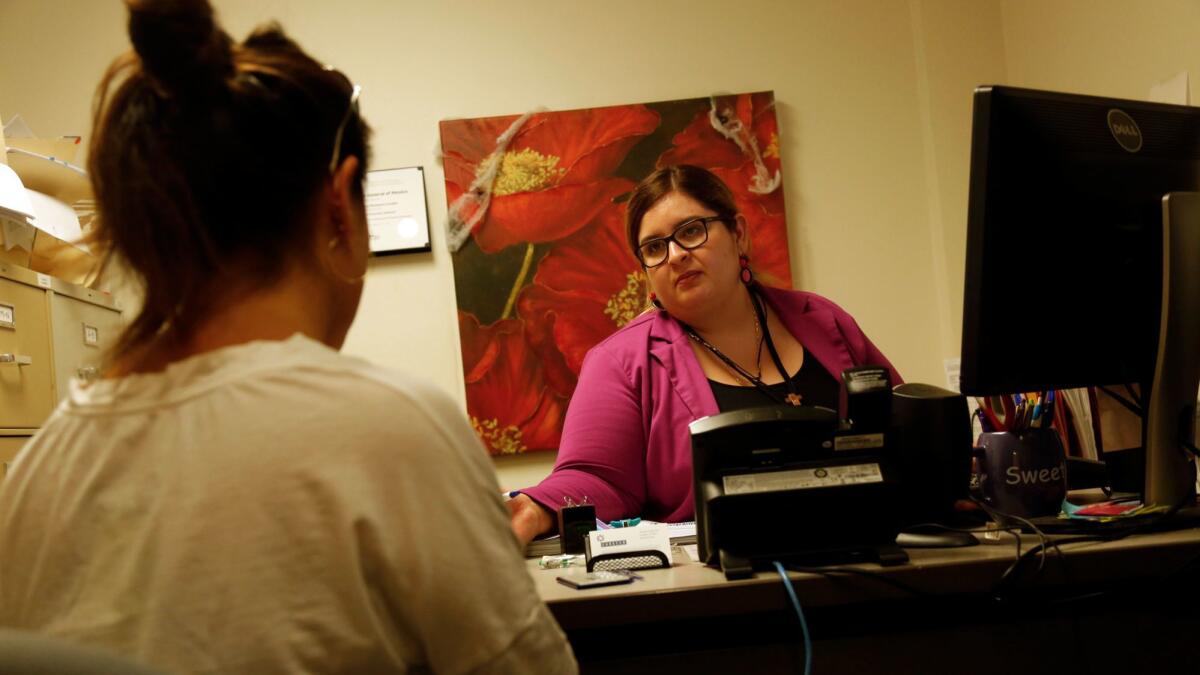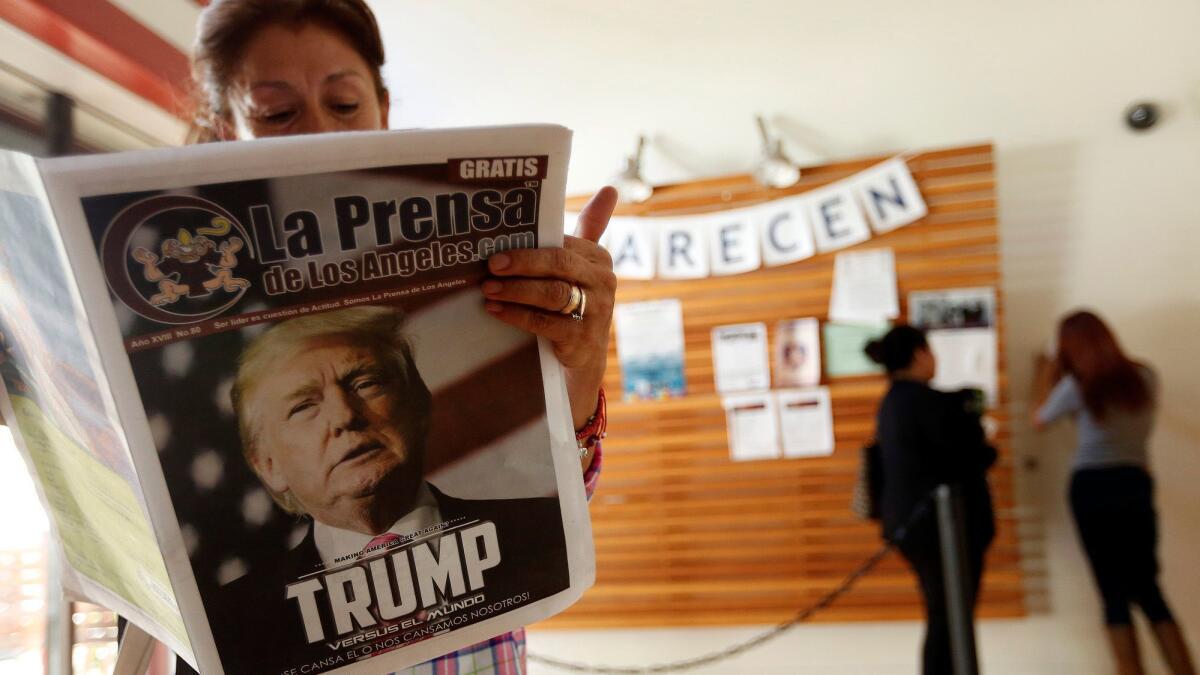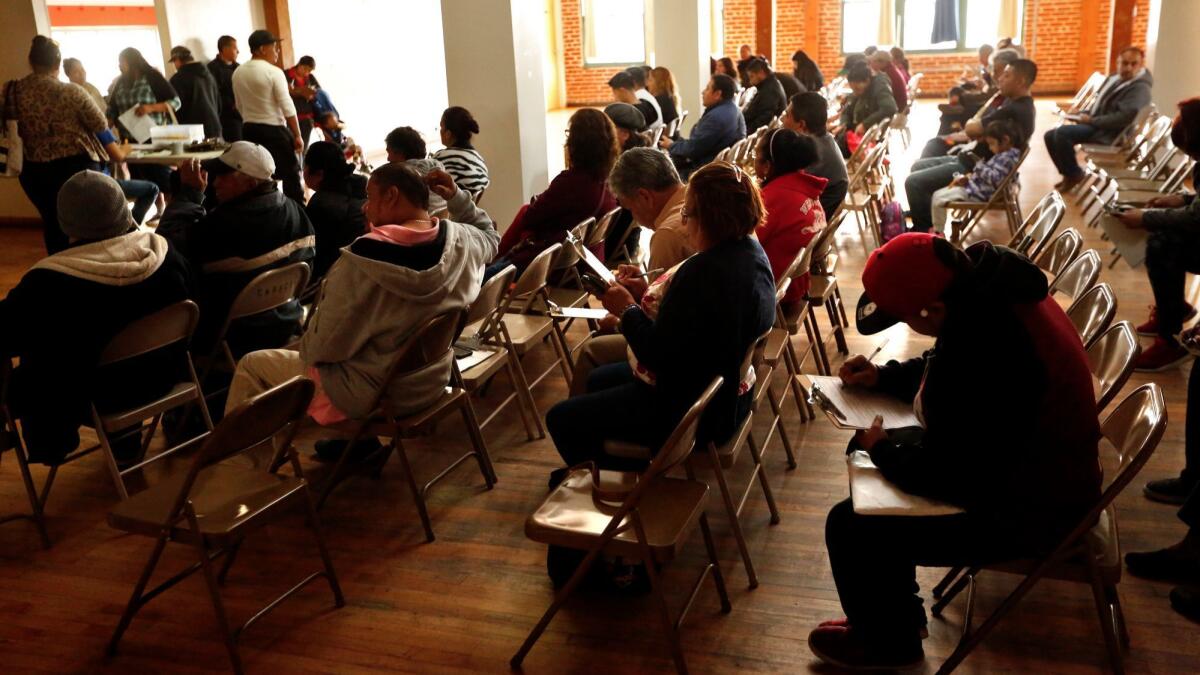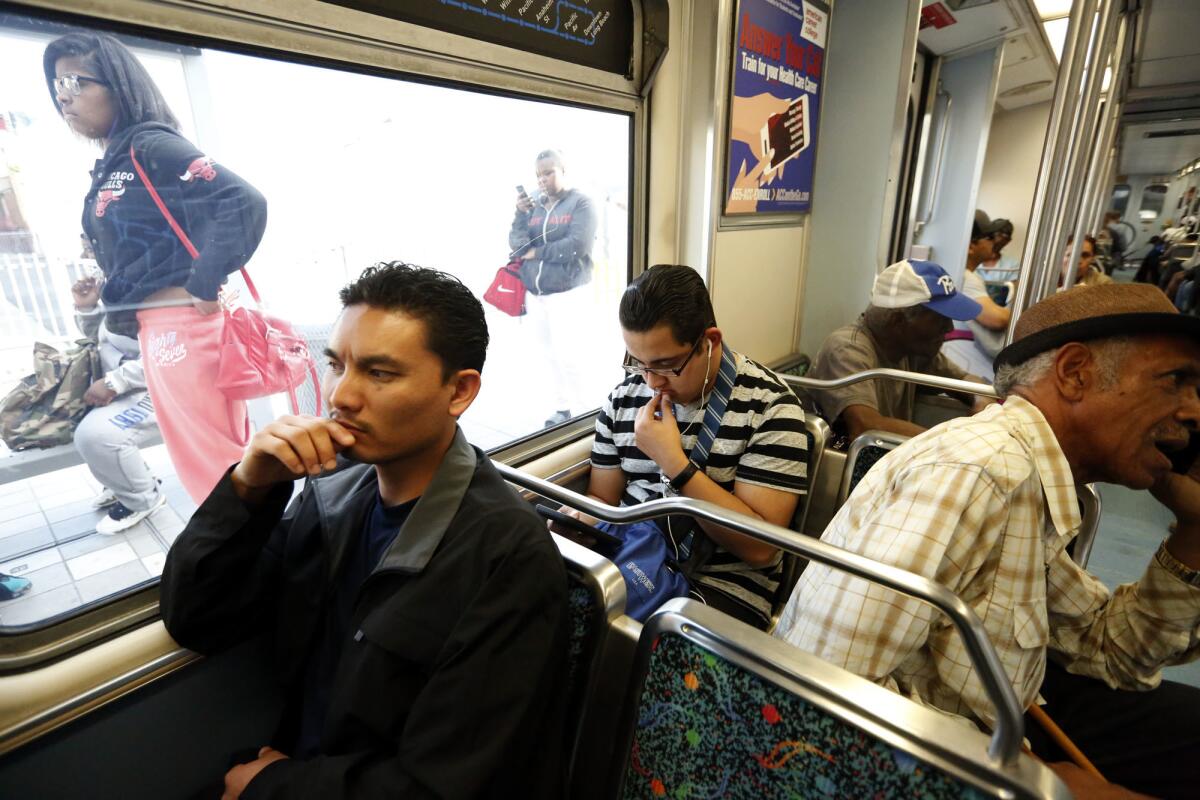California lawmakers want to provide attorneys to immigrants facing deportation. But who gets the help?

- Share via
Flustered and out of money, Maria paced through the empty aisles of a Marshalls department store in Orange County three days before her son’s eighth-grade graduation. She picked out a pair of black dress shoes for him and a crisp, gray long-sleeved shirt.
Then, she clumsily stuffed them in her large purse and attempted to walk out.
That is how Maria, a petite, 38-year-old waitress who asked that her full name be withheld for fear of reprisal from authorities, says she almost became a felon and faced deportation, consequences that could have proved much more severe had she not found lawyers to represent her in court.
Amid a tense political battle over the nation’s borders and who should be expelled from the country, California lawmakers this legislative session are on an emergency track to develop what is likely to be the largest legal defense program in the U.S. for immigrants swept into the federal removal process.
Under the proposed law, the state-funded legal program would fall under the purview of the California Department of Social Services. The agency would vet funding applications and award contracts to nonprofits that provide attorneys for immigrants — either directly or through subcontractors — and meet certain qualifications.
But the legislation, accelerated by Democratic leaders to counter the
Cases like Maria’s underscore the challenges lawmakers could face in developing such a program. U.S. immigration law comprises an unwieldy and confusing network of state and federal rules that lawyers often find hard to navigate. People in the U.S. illegally often enter the system through the criminal pipeline, but immigration lawyers say not all are criminals who should be cast out of the country.
“In my case, people probably think that I deserved to be deported,” Maria said on a recent morning in February. “I don’t blame people for thinking that way, but I also think that if we are able to learn from our mistakes and be better, we deserve a chance to stay.”

Born in Queretaro, Mexico, Maria lived in Orange County for more than a decade before her arrest on June 14, 2011. Though she had no previous run-ins with police, she had stolen clothes and food on four other occasions, the first after she watched her sons devour their dinner in hunger at her sister’s apartment.
Maria said she had been struggling to keep her own kitchen shelves stocked but had not wanted to turn to her sister for help and reveal the darker aspects of her life.
Over five years of marriage, she said, her ex-husband had become jealous and violent. He stopped letting her work, Maria said, keeping her on a meager budget that wasn’t enough to provide for her two sons, now 18 and 13.
“I am responsible for all of my actions,” she said, holding back tears. “But I was in this relationship that I thought I was a worthless person, and it was very difficult for me to get out of that place.”
She would not make it to her older son’s eighth-grade graduation. After the Marshalls incident, Maria, who had a fake driver’s license and social security number as forms of identification, was charged with burglary in the second degree — a felony — and five misdemeanors, including petty theft, possession of burglary tools — her purse — and the use of false documents.
She was still luckier than most, she said. Other inmates advised her not to accept a plea deal until prosecutors dropped the felony. Two months later, after she was convicted on three of the lesser offenses, she was transferred to a detention center.
There, Maria spent another month and met immigration lawyers with the Central American Resource Center, a Los Angeles nonprofit that took up her case, charging her $1,500 she could afford in small installments.
“I didn’t know anything,” she said of navigating the process. “A lot of women were telling me, ‘You shouldn’t be here for this type of situation.’ But I wasn’t paying attention to that. I was thinking about how I had left my children.”

Unlike in the criminal justice system, where the U.S. Supreme Court has held that the Constitution grants all defendants the right to counsel regardless of their income, people facing deportation are not entitled to an attorney if they cannot afford one.
But over more than six years, as the Obama administration prioritized immigrants with criminal charges for removal from the country, immigration and civil rights lawyers in California and nationwide have worked to expand legal representation and ensure fair treatment of the most vulnerable immigrants under the law.
The movement to increase government-funded access to counsel has centered on showing that many immigrants would be granted relief if they had the resources to prove their cases and that for some, the repercussions of deportation could be as dire as a death sentence.
Momentum behind the effort started building long before Donald Trump announced his run for president, lawyers said, but has gained steam as his enforcement priorities stripped away restrictions on who can be deported, allowing immigration agents to detain nearly anyone they come in contact with who has crossed the border illegally.
“This issue had been out there for awhile,” said Daniel Sharp, legal director of the Central American Resource Center. “The Trump election fast-forwarded it.”
Groundwork for the first legal defense program for immigrants came out of the Vera Institute of Justice in New York. Other cities have since sought to replicate the model, including Washington, Chicago and Boston. In San Francisco and Los Angeles, city funds have been approved or promised for such efforts.
This year’s legislation in Sacramento, introduced by state Sen.
A year later, the state authorized $15 million for the development of a federal assistance program to help thousands of immigrants apply for naturalization and Obama’s deferred action programs, known as Deferred Action for Childhood Arrivals and Deferred Action for Parents of Americans and Lawful Permanent Residents.
As of fiscal year 2015, the Department of Social Services, which administered both legal defense initiatives, had contracted with nonprofits to serve more than 1,300 children, with an average cost per case totaling $5,000. Its second program has awarded a little over $14 million to 61 organizations and is in the midst of finalizing contracts for the 2016 fiscal year, for over $29 million to about 80 immigration and legal aid groups.

But in California, where more than 2 million people who are in the U.S. illegally live and could potentially seek services, debate has simmered over who should benefit from the broader state-funded initiative. That question has become more pressing amid a looming deficit and potential funding cuts from the federal government.
In the latest iteration of the bill, the legal defense program would cost $12 million from the general fund, and the legislation would create the California Universal Representation Trust Fund to accept donations from private foundations and philanthropic entities.
Legal services would be available for any person arrested by U.S. Immigration and Customs Enforcement, anyone released on parole for the purposes of deportation and anyone detained at a state airport or port of entry.
Hueso initially amended the bill to exclude all those convicted of a violent felony outlined in the penal code, a list that some lawmakers this year are trying to expand. But new changes to the language of the proposal, released Thursday, would loosen the restriction, making all immigrants eligible to apply and be screened for services.
The amendment would prohibit the representation of clients convicted of a violent crime unless they have “a meritorious claim for relief from deportation,” meaning the person has a high likelihood of not being removed from the U.S. based on the facts of the case.
Immigrant advocates and legal aid agencies have lauded the compromise, which they said would counter anti-immigrant rhetoric from the Trump administration associating illegal immigration with violent crime.
San Francisco Public Defender Jeff Adachi, who has helped shape many city-funded legal defense programs, was among those who had vigorously opposed any limit to legal aid for immigrants on the basis of a prior conviction.
Speaking on his behalf at the bill’s first hearing before the Senate Judiciary Committee, immigration attorney Francisco Ugarte said it would “set a dangerous precedent throughout the country for other initiatives where we are fighting for access to counsel.”
But it remains to be seen how moderate Democrats and Republicans, who have argued against using taxpayer funds to defend dangerous offenders, will react to the move.
Joe Guzzardi, national media director for Californians for Population Stabilization, said state funds should not be used to defend immigrants in the country illegally when the state has so many other needs.
“But if the fund is predestined [to succeed], it would probably be better spent on immigrants that don’t have criminal records,” he said.
Essential Politics: Trump’s immigration plans get serious »
Under the proposed state legal program, Maria, who eventually gained legal permanent residency through a visa for domestic violence victims, would have been covered despite her criminal charges.
Phal Sok might not.
Now 35, Sok, who is Cambodian, was born in a refugee camp in Thailand and brought to the U.S. when he was less than a year old. At 16, he lost his father, his sole guardian, to cancer.
He struggled with depression and fell behind in school. A year later, he was convicted of three felony counts of armed robbery after he and his friends held up a mom-and-pop sewing shop. He served 15 years in prison on a 23-year sentence before he was released under an initiative meant to aid juvenile offenders.
But because of an immigration hold, federal agents waited for him outside the prison and took him into detention, where he has since been temporarily held twice as a judge weighs his case.
Not able to afford a lawyer, Sok spends his days reading old cases and researching immigration law, battling a deportation order to return him to a country he has never known as an adult.
“They got offices full of attorneys, and I am just here by myself, searching the Internet, trying to figure it out,” he said.
Freedom has been bittersweet, he said. Some days are filled with dread.
“In a sense, I feel like I am being double punished,” he said.

Twitter: @jazmineulloa
ALSO
Trump administration clears the way for far more deportations
First of several immigrant protection bills clears state Senate Public Safety Committee
Updates on California politics
UPDATES:
11:06 a.m.: This article was updated to include a new cost estimate for the legal immigrant defense program.
This article was originally published at 12:00 a.m.
Get the L.A. Times Politics newsletter
Deeply reported insights into legislation, politics and policy from Sacramento, Washington and beyond. In your inbox three times per week.
You may occasionally receive promotional content from the Los Angeles Times.








